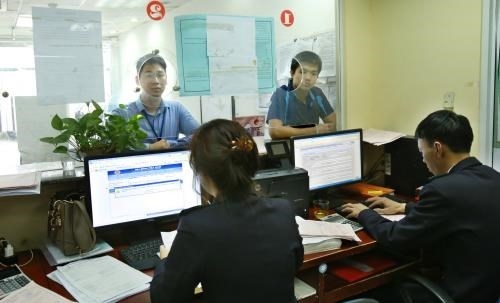A business processes document procedures at Hanoi Customs Department (Photo: VNA)
Q: Could you brief us on the preparation of applying information technology (IT) in e-Government activities in Hanoi?
A: Hanoi has paid significant attention to and closely directed this task, as well as affirming the targets in the city's annual plan for IT application.
Specifically, Hanoi has worked with the military-run telecom company Viettel in order to build a main data centre with full server infrastructure, system software, security equipment, to serve the system of online public administrative services and specialised information system. Meanwhile, they have worked to maintain the Backup Data Centre at the Hanoi Department of Information and Communication, ensuring a continuous connection to the main Data Centre. Hanoi has also deployed and maintained a comprehensive WAN network, connecting 100% of departments, committees, districts, towns, communes, wards and townships in order to synchronise and interleave data in the workflow.
On that basis, the city has applied IT in management activities such as the residential database system with over 7.5 million records and the civil status records. Online public services for citizens and enterprises have seen great improvement. Currently, the city has a total of 391 online administrative procedures at level 3 and 4, accounting for nearly 20.4% of the total administrative procedures in the city.
Q: What do you think about the ability of the staff and people to approach this modern equipment and technical infrastructure?
A: In order to deploy an effective IT application, it is necessary to interact with the people and enterprises. Therefore, the city is continuing to popularise its online public services and more and more people have approached the new form.
A number of online public services have proven to be effective, for example, 90% of the administrative procedures related to the justice sector was executed online, online passport applications also accounted for 80% of the total procedures, while the rate of online business registration and customs and taxes transactions reached 70% and almost 100%, respectively. Of course, there are still many citizens who have not adapted to the implementation of online public services, especially in the suburban areas where IT facilities remain limited.
Q: What are the difficulties in the process of building the e-government in Hanoi?
A: The city should pay greater attention to directing the application of IT in the State agencies as well as to raise the awareness of cadres and staff at all levels.
In addition, many administrative procedures are still cumbersome and complicated. Several ministries and branches do not have plans or advanced notification when implementing IT applications in localities, thus a lot of the contents overlapped with the city’s implementation plan. The integration of a number of ministries’ application with the city’s existing system has been compatible, which has caused difficulties in connection and communications. In order to make people widely accept the use of these IT applications, it is necessary to continue simplifying the administrative procedures.
Q: What are the solutions?
A: Hanoi will continue to popularise and raise awareness of this work to the whole team of leaders, managers, people and enterprises. The leadership and direction of the Party committees, administrations and IT Steering Committees at all levels should be enhanced. IT application and administrative reforms should be closely associated. IT application must be compulsory in each strategy, planning, development plan, as well as in the schemes and investment projects of each branch, sector and unit.
The city will try its utmost to coordinate with the relevant ministries and branches in deploying IT application, to ensure synchronisation and connection from central to local level, as well as effectively taking advantage of these applications.
Thank you very much!

